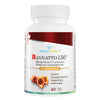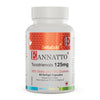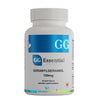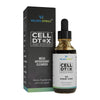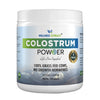Yellow bell peppers are not just vibrant and flavorful; they are also an excellent source of nutrition. Understanding the content of nutrition in yellow bell pepper can help individuals make informed choices and promote healthy eating habits. Incorporating yellow bell peppers into your balanced diet not only adds vibrant color to your dishes but also contributes to your overall well-being.
Key Takeaways:
- Yellow bell peppers contain vitamins A, C, and B6, antioxidants, and dietary fiber, and are low in calories.
- The high vitamin C content in yellow bell peppers makes it a natural immune system booster.
- The antioxidants in yellow bell peppers protect the body against harmful free radicals, contributing to longevity and good health.
- Incorporating yellow bell peppers into your diet is an excellent way to contribute to healthy weight loss and reduce the risk of chronic diseases.
- Yellow bell peppers can be enjoyed in various easy-to-prepare dishes, adding both flavor and nutrition to your meals.
Nutrition in Yellow Bell Pepper
Yellow bell peppers are a powerhouse of essential vitamins and minerals necessary for overall health and well-being. One medium-sized pepper, approximately 186 grams, contains 50 calories, 1 gram of fat, 3 grams of protein, and 12 grams of carbohydrates, making it a low-calorie, nutrient-dense food.
Yellow bell peppers are an excellent source of vitamin C, providing more than 150% of the recommended daily intake per serving. Vitamin C is an antioxidant that helps boost the immune system, protect cells from damage, and aid in collagen production for healthy skin.
In addition, yellow bell peppers are rich in vitamin A, providing over 70% of the daily value per serving. Vitamin A is essential for eye health and can promote healthy skin, teeth, and bones.
Yellow bell peppers also contain significant amounts of potassium, folate, and dietary fiber. Potassium is beneficial for maintaining healthy blood pressure, while folate plays a crucial role in cell growth and development.
Dietary fiber is essential for promoting digestive health and aiding in weight management. One medium-sized yellow bell pepper contains approximately 3 grams of dietary fiber, making it a great addition to a balanced diet.
Overall, the high nutrition in yellow bell peppers makes them an excellent addition to any healthy eating plan. Incorporating this vegetable into your diet can help you achieve optimal nutrition and overall wellness.
Yellow Bell Pepper and Vitamin C
Yellow bell peppers are an excellent source of vitamin C, one of the most important nutrients for overall health. Just one large pepper contains over 150% of the daily recommended value of vitamin C. This powerful antioxidant plays a vital role in supporting the immune system, promoting healthy skin, and aiding in collagen production.
Vitamin C also helps the body absorb iron from plant-based foods, making it a particularly important nutrient for vegetarians and vegans. Studies have shown that a diet rich in vitamin C can reduce the risk of chronic diseases such as heart disease and some types of cancer.
Unlike supplements, yellow bell peppers provide a natural and fresh source of vitamin C, making them an excellent addition to any diet. Whether eaten raw, roasted, or cooked into a dish, yellow bell peppers offer a delicious and nutritious way to boost your vitamin C intake.
Yellow Bell Pepper and Antioxidants
Yellow bell peppers are rich in antioxidants that can help eliminate free radicals and harmful substances that can cause cell damage and lead to various diseases. They contain carotenoids such as beta-carotene, lutein, and zeaxanthin, which contribute to the yellow color of the peppers and offer antioxidant benefits.
Antioxidants neutralize free radicals by donating electrons to them, which prevents them from damaging cells. Yellow bell peppers are an excellent source of Vitamin C, which is a well-known antioxidant that can protect cells from damage caused by free radicals. Furthermore, they contain Vitamin E and flavonoids, which also exhibit antioxidant properties.
Beta-carotene: This antioxidant is converted to Vitamin A in the body, and it protects against sun damage, promotes healthy skin, and supports eye health.
Lutein and zeaxanthin: These carotenoids are essential for eye health and can help prevent age-related macular degeneration, cataracts, and other vision problems.
Vitamin C: This potent antioxidant can boost immune function, aid in collagen production, and protect against chronic diseases such as heart disease and cancer.
Vitamin E: This antioxidant protects cells from damage caused by free radicals, reducing the risk of chronic diseases and promoting healthy skin and hair.
Flavonoids: These compounds have potent antioxidant and anti-inflammatory properties that are beneficial for heart and brain health, and they can also improve blood flow and reduce blood pressure.
Incorporating yellow bell peppers into your diet can provide your body with a rich source of antioxidants that can help promote overall health and reduce the risk of chronic diseases. They are a versatile and delicious addition to salads, soups, stir-fries, and other dishes.
Yellow Bell Pepper for Weight Loss
Yellow bell peppers can be a great addition to a weight loss diet due to their low-calorie content and high fiber. With just 50 calories per cup, yellow bell peppers provide a satisfying crunch and sweetness that can help curb cravings and keep you feeling full for longer periods.
In addition to being low in calories, yellow bell peppers are rich in dietary fiber, which promotes digestive health and helps regulate blood sugar levels. Fiber also helps you feel fuller for longer, reducing the risk of overeating or snacking on unhealthy foods.
Yellow bell peppers are also a good source of vitamin C, which can aid in weight loss by helping the body burn fat during exercise. Studies have shown that high vitamin C intake is associated with lower body fat and a smaller waist circumference.
Overall, incorporating yellow bell peppers into a weight loss diet can help you achieve your goals by providing a nutrient-dense and low-calorie food option that supports digestive health and promotes a feeling of fullness.
Yellow Bell Pepper and Immune System
Yellow bell peppers are a great source of vitamin C, which is essential for a healthy immune system. A single cup of sliced yellow bell pepper provides more than 150% of the recommended daily intake of vitamin C. This nutrient helps boost the production of white blood cells, which helps fight off infections and diseases.
In addition to vitamin C, yellow bell peppers contain other nutrients, like vitamin A, vitamin B6, and folate, that also support the immune system. They also contain antioxidants, like carotenoids and flavonoids, that help reduce inflammation and protect against cell damage.
Studies have shown that vitamin C and other nutrients found in yellow bell peppers may help reduce the risk of chronic diseases, like heart disease and cancer. By incorporating yellow bell peppers into your diet, you can support your immune system and overall health.
Health Benefits of Yellow Bell Pepper
Yellow bell pepper is a nutrient-dense vegetable that offers numerous health benefits when incorporated into a balanced diet. Here are some of the benefits from nutrition in yellow bell pepper:
Improved Digestion
The high fiber content in yellow bell pepper aids in digestion and can prevent constipation. It also promotes the growth of beneficial gut bacteria, which can improve overall digestive health.
Heart Health
Yellow bell pepper contains potassium, which supports heart health by regulating blood pressure and reducing the risk of stroke. The antioxidants in yellow bell pepper also help prevent the oxidation of cholesterol, which can lead to heart disease.
Eye Health
The high levels of vitamin A and carotenoids in yellow bell peppers promote healthy vision and protect against age-related eye diseases such as macular degeneration.
Skin Health
The antioxidants in yellow bell pepper protect against skin damage caused by free radicals and can prevent premature aging of the skin. The vitamin C in yellow bell pepper also aids in collagen production, promoting healthy and youthful-looking skin.
Overall, yellow bell pepper is a versatile and healthy vegetable that can provide numerous benefits when added to your diet. Enjoy it roasted, raw, or sautéed for a delicious and nutritious addition to any meal.
How to Select and Store Yellow Bell Pepper
Yellow bell peppers are a nutritious and delicious addition to your diet, and selecting and storing them properly can help ensure optimal freshness and flavor. Follow these practical tips:
Choosing the Perfect Yellow Bell Pepper
- Look for peppers that are firm, heavy for their size, and have a bright yellow color.
- Avoid peppers that have soft spots, wrinkled skin, or discoloration.
- Check the stem end - it should be green and fresh-looking.
Storing Yellow Bell Peppers
- Yellow bell peppers can be stored in a plastic bag in the refrigerator for up to a week.
- Keep them dry by patting them dry with a paper towel before storing them.
- If you cut a pepper and only use a portion of it, keep the remainder wrapped in plastic and store it in the fridge.
- Do not store yellow bell peppers in the pantry or at room temperature, as they will quickly become over-ripe and spoil.
By selecting and storing your yellow bell peppers properly, you can enjoy their fresh and vibrant flavor in a variety of dishes!
Nutritional Comparison: Yellow Bell Pepper vs. Other Peppers
Yellow bell peppers are a popular vegetable known for their sweet and mild flavor. However, how do they compare nutritionally to other types of peppers?
When it comes to vitamins and minerals, yellow bell peppers stand out compared to their colorful counterparts. For instance, a medium-sized yellow bell pepper contains almost 200% of the daily recommended intake of Vitamin C, while its red and green counterparts contain approximately half that amount.
Yellow bell peppers also contain high amounts of Vitamin E, which is essential for healthy skin and hair, and Vitamin B6, which helps support brain function and helps the body produce red blood cells.
Yellow bell peppers contain potassium, an essential mineral for regulating blood pressure and preventing heart disease, and fiber, which can improve digestion and promote weight loss. When compared to other peppers in the same family, yellow bell pepper has a higher level of valuable nutrients.
Additionally, yellow bell peppers are low in calories, making them an excellent vegetable for those watching their weight. They are also versatile, adding flavor and color to salads, stir-fries, and casseroles.
Overall, while all peppers contain a host of vitamins and minerals, the yellow bell pepper outshines the rest in terms of nutritional content and health benefits.
Incorporating Yellow Bell Pepper Into Your Diet
Yellow bell peppers are a delicious and nutritious addition to any diet. Here are some practical tips and suggestions for incorporating this versatile vegetable into daily meals and snacks:
Add to salads: Chop up a yellow bell pepper and add it to your favorite salad for an extra crunch and pop of color.
Roast in the oven: Cut into slices or quarters and roast in the oven with a drizzle of olive oil and your favorite seasonings for a tasty and healthy side dish.
Stir-fry: Slice the yellow bell pepper and cook it up in a stir-fry with some other veggies for a quick and easy meal.
Dip in hummus: Cut the yellow bell pepper into strips and use them as a healthy and tasty vehicle for dipping into hummus or other dips.
Combine with other ingredients: Yellow bell pepper adds a lovely sweetness and crunch to sandwiches, wraps, and quesadillas. Try combining it with other healthy ingredients like avocado or grilled chicken.
Adding yellow bell pepper to your meals is an easy and delicious way to boost your nutrient intake. Experiment with different cooking methods and flavor combinations to find your favorite ways to enjoy this healthy vegetable!
Conclusion
Yellow bell peppers are a nutritious and delicious addition to any diet. There are many reasons why yellow bell pepper is good for you, including its high vitamin C content, antioxidant properties, and low-calorie, high-fiber profile. By incorporating yellow bell peppers into your meals, you can support your immune system, promote weight loss, improve digestion, and enhance heart, eye, and skin health.
Whether you enjoy yellow bell peppers raw or cooked, there are many ways to incorporate them into your daily meals. You can add them to salads, stir-fries, soups, and sandwiches, or even roast them for a tasty snack. With their vibrant color and sweet flavor, yellow bell peppers are sure to please your taste buds while providing valuable health benefits.
So, next time you're at the grocery store, be sure to pick up some fresh yellow bell peppers and start experimenting with different recipes and cooking methods. By making yellow bell peppers a regular part of your diet, you can enjoy all the nutritional benefits they have to offer and support your overall well-being.
Frequently Asked Questions
What is the nutrition in yellow bell pepper?
A: Yellow bell peppers are low in calories and high in essential vitamins and minerals. They are a great source of vitamin C, vitamin A, potassium, and dietary fiber. They also contain antioxidants that promote overall health.
How does yellow bell pepper benefit the immune system?
A: Yellow bell peppers are packed with vitamin C, which is known to boost the immune system. Vitamin C helps in the production of white blood cells that defend the body against infections. Including yellow bell peppers in your diet can strengthen your immune system.
Can yellow bell pepper help with weight loss?
A: Yellow bell peppers are a weight-loss-friendly food due to their low-calorie content and high fiber. The fiber in yellow bell peppers promotes satiety, making you feel fuller for longer. Additionally, they are a nutritious alternative to high-calorie snacks.
What are the health benefits of consuming yellow bell pepper?
A: Yellow bell peppers offer numerous health benefits. The nutritional value of yellow bell pepper supports digestion, improves heart health, promotes healthy eyesight, and enhances skin health. Their rich nutritional profile contributes to overall well-being.
How can yellow bell peppers be incorporated into a diet?
A: Yellow bell peppers can be enjoyed in various ways. They can be added to salads, stir-fries, sandwiches, or consumed as a crunchy snack. They can also be stuffed or used in soups and stews. Get creative and experiment with different recipes!
Disclaimer: These statements have not been assessed by the FDA. The information contained within this page is for educational purposes only. It is not intended to replace the advice or attention of health care professionals.
